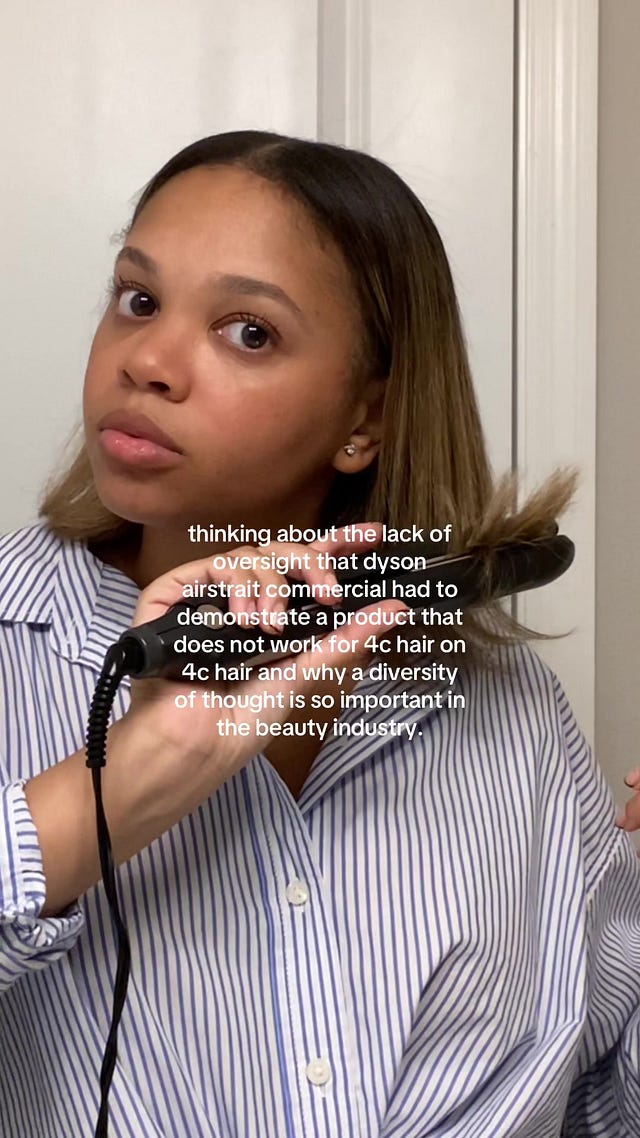What is the beauty industry without a little controversy? Last week, Dyson found itself at the centre of a heated conversation with the launch of its latest product, the Dyson Airstrait™. Marketed as a 'new way to straighten hair from wet to dry, with air,' the Airstrait™ promises minimal heat damage. However, unlike traditional straighteners, the Airstrait™ doesn’t use hot plates to transfer heat. Instead, it relies on high-pressure airflow. I still don’t quite get it - in theory, it sounds impressive, but in reality - specifically if you have 4C hair - it’s a different story.
As part of the launch, Dyson released a promotional video showing the Airstrait™ in action on a model with 4C hair. The results? Well, there were no results. I don’t think it was what anyone was expecting; the model's hair looked almost unchanged after running the tool through it. Dyson might be at the top of their game when it comes to innovation, but something wasn’t adding up. They were doing a poor job of convincing anyone with 4C hair that they needed this tool in their collection.
Many people found it baffling - why market the Airstrait™ as a straightener for all textures if it couldn’t visibly straighten 4C hair? They even went out of their way to prove it to us. Social media was in uproar, and rightly so. Black consumers and influencers expressed frustration over what they saw as a superficial attempt to include Black hair without taking the time to understand the needs of Black women and the nuances of caring for and styling Black hair. Many accused Dyson of “hair-washing” or using Black representation without fully understanding what it means for a tool to be suitable for Black consumers.
In response, Dyson quickly took down the video, but by then, the damage was done. In a statement to Marie Claire, Dyson explained, “Dyson is engineered for all hair types and textures. Demonstrating how our products work is our priority, and for coily hair specifically, the Dyson Airstrait is best used to stretch the hair as a step in a haircare routine. This social media clip did not demonstrate this effectively, and so we have taken it down.” Yikes! One point made by many Black women on platforms like TikTok and Instagram was that this could so easily have been avoided had there been a Black person on the team. Brands talk about diversity, but it’s so rarely there, and they so clearly need it.
While Dyson’s statement clarified that the Airstrait™ is more effective as a tool for stretching 4C curls rather than fully straightening them, their initial advertisement failed to communicate this, leaving many viewers with unrealistic expectations. Essentially, for anyone with 4C-type hair, the Airstrait™ is a tool that will stretch the hair - offering a way to dry and lightly smooth it without subjecting it to high heat - even though it presents itself as a straightener. This is the issue: you can’t market a universal tool that does one thing, but in reality, it does different things depending on your hair type. By advertising the Airstrait™ as a universal straightener, Dyson set expectations that it couldn’t meet for consumers with highly textured hair. It’s not the consumer’s job to figure out whether your product is what you say it is.
And here we are again. At this point, it’s just another day in the beauty industry, and another incident sparking yet more conversations about how brands promote products to Black consumers and the importance of authentically engaging with the communities they aim to serve. Hopefully, this will be it for at least this year - no more controversies.
Face Value is a “weekly” newsletter about beauty, culture, and the way we perceive beauty. If this is something you’re interested in, consider subscribing and sharing.






